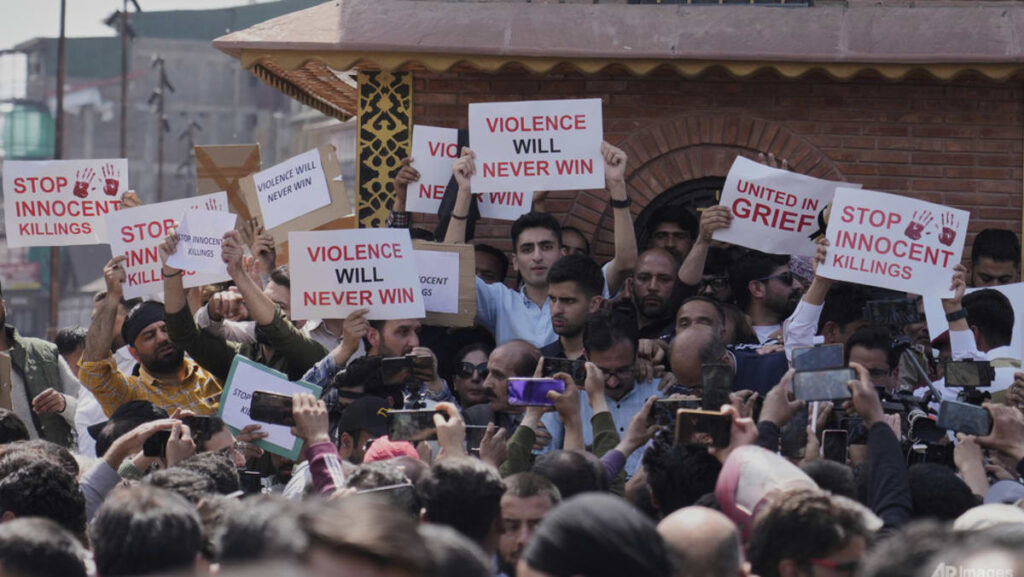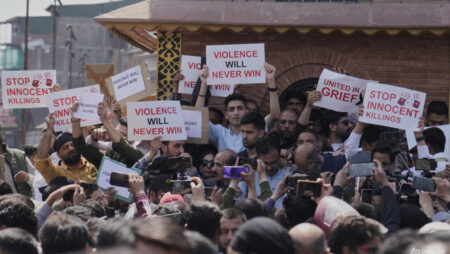“EVIL AGENDA WILL NOT SUCCEED”
The attacks came on Tuesday afternoon at three spots within Baisaran valley at Pahalgam where gunmen burst out of the forests and ambushed crowds of visitors with automatic weapons.
The men, said to be from the militant group Kashmir Resistance, claimed responsibility for the attack in a social media message.
The group said that more than 85,000 “outsiders” had been settled in the region after arriving as tourists, vowing violence against such settlers.
In a fresh statement on Wednesday, Kashmir Resistance said that the “individuals targeted were not ordinary tourists; instead, they were linked to and affiliated with Indian security agencies”.
“It was not a typical tourist group but rather an undercover agency tasked with research.”
The attacks should “serve as a wake-up call not only for Delhi but also for those who support Delhi’s questionable strategies”, the group added.
“Resistance fighters plan to intensify their strategic attacks to ensure that those involved in undermining … (the) resistance struggle face appropriate consequences.”
India’s Prime Minister Narendra Modi, who had been on a two-day visit to Saudi Arabia, cut short his trip and returned to his country on Wednesday morning.
Modi held a meeting with the national security adviser, the foreign minister and other senior officials at the airport. A special security Cabinet meeting was called, a defence ministry official said.
The prime minister decried the attacks in an earlier Facebook post, pledging that those involved would be brought to justice.
“Their evil agenda will never succeed,” he wrote.
“Our resolve to fight terrorism is unshakable and it will get even stronger.”
Hundreds of security forces rushed to the Pahalgam area soon after the attacks and a massive combing operation was launched in the forests there.
About 100 people suspected of being militant sympathisers in the past were called to police stations and questioned.
Militant violence has afflicted Kashmir, claimed in full but ruled in part by both India and Pakistan, since the anti-Indian insurgency began in 1989. Tens of thousands of people have been killed, although violence has tapered off in recent years.
India revoked Kashmir’s special status in 2019, splitting the state into two federally administered territories: Jammu and Kashmir, and Ladakh. The move allowed the local authorities to issue domicile rights to outsiders, allowing them to get jobs and buy land in the territory.
That led to a deterioration of ties with Pakistan, which also claims the region. The dispute has spurred bitter animosity and military conflict between the nuclear-armed neighbours.
Indian security agencies said that Kashmir Resistance is a front for Pakistan-based militant organisations such as Lashkar-e-Taiba and Hizbul Mujahideen.
Pakistan has said that it provides only moral and diplomatic support to the insurgency in Kashmir.
“We are concerned at the loss of tourists’ lives,” Pakistani foreign ministry spokesperson Shafqat Ali Khan said in a statement.
“We extend our condolences to the near ones of the deceased and wish the injured a speedy recovery.”
For Singaporeans in India who wish to call Singapore’s Ministry of Foreign Affairs Duty Office, the 24-hours number is +65 6379 8800 / 8855. Or they may email to mfa_duty_officer [at] mfa.gov.sg.
Read the full article here


